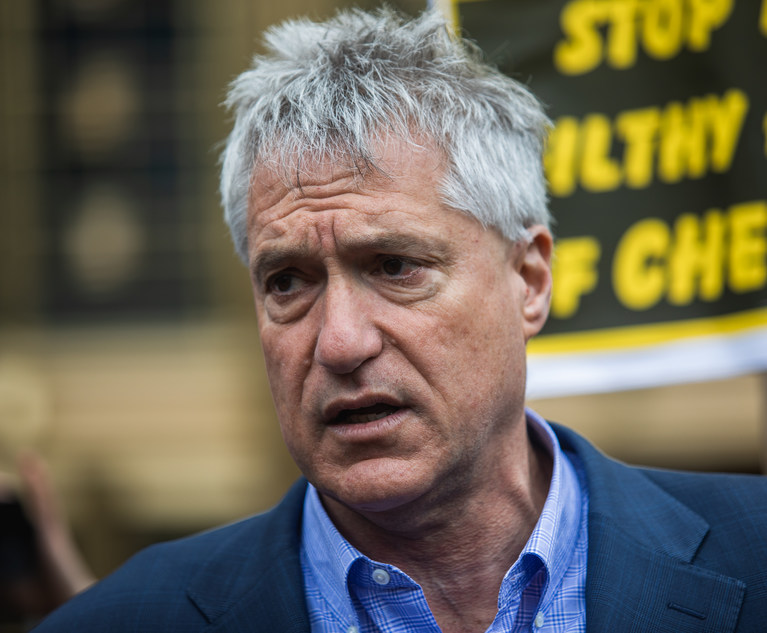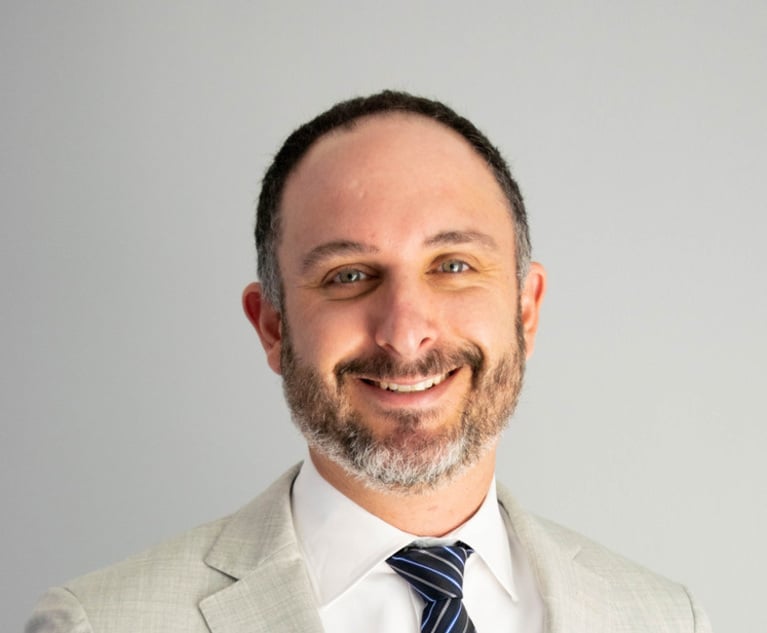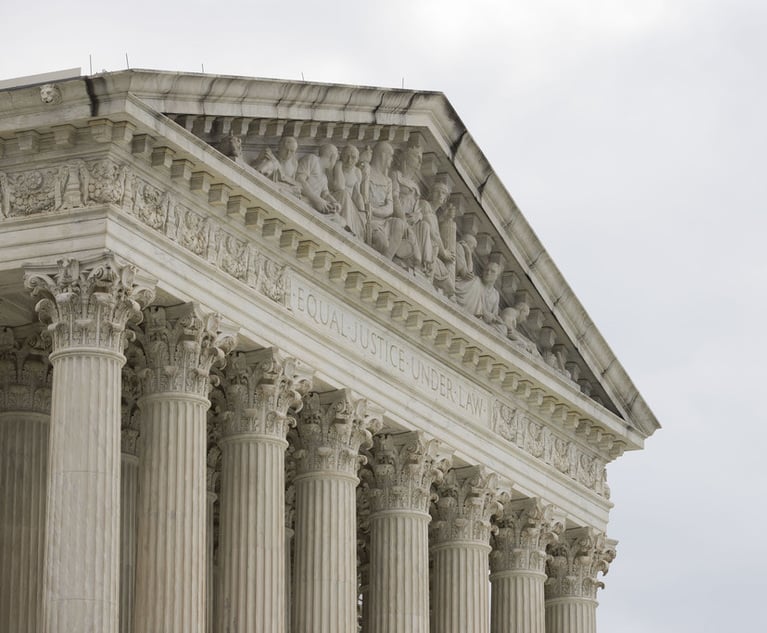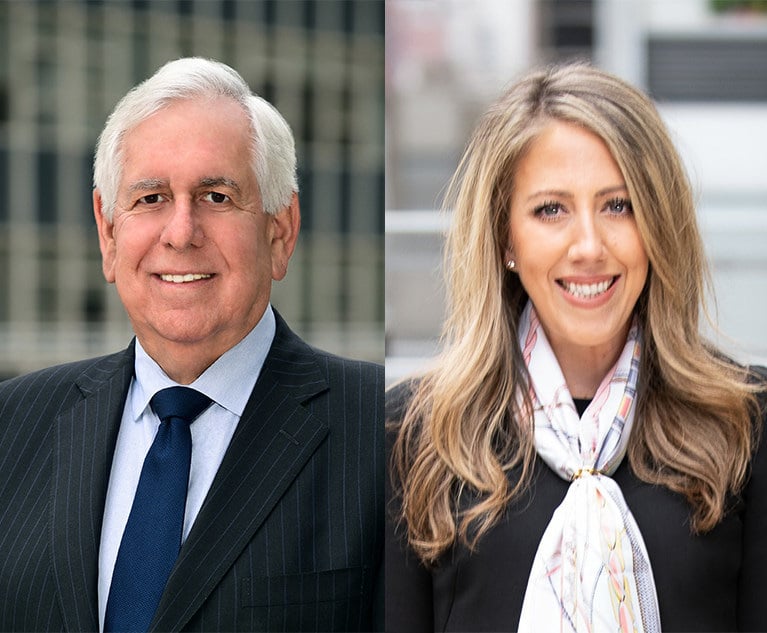As Donziger Serves Sentence, His Lawyers and Special Prosecutor Battle Before 2nd Circuit Over Prosecutor's Appointment
Lawyers argued fiercely about whether there had been sufficient, or any, DOJ oversight of Rita Glavin, the judge-appointed special prosecutor, during the contempt case, and about whether an alleged lack of such supervision had violated the U.S. Constitution or Supreme Court case law.
December 01, 2021 at 10:44 AM
8 minute read
 Steven Donziger speaks to supports calling for his release outside of the United States District Court in Manhattan, New York on the first day of his trial, Monday May 10, 2021. Photo: Ryland West/ALM[/caption] As Steven Donziger was entering his sixth week in prison following his contempt-of-court conviction, his lawyers and court-appointed special prosecutor Rita Glavin on Tuesday argued before the U.S. Court of Appeals for the Second Circuit over whether Glavin's appointment by the judiciary into the special prosecutor role had been constitutionally sound. And in related arguments, they battled fiercely about whether there had been sufficient, or any, Department of Justice oversight of Glavin during the Donziger contempt case, and about whether an alleged lack of such supervision had violated the U.S. Constitution or Supreme Court case law. Donziger's legal team, led during the oral arguments by University of Texas law school professor Steven Vladeck, aimed a series of often-nuanced and complicated arguments at a three-judge panel. They sought Donziger's release from prison and to overturn his conviction on six misdemeanor counts of criminal contempt. At the same time, the appeal tied to Donziger, the internationally known, now-disbarred lawyer who in 2011 helped secure an $8.6 billion pollution judgment in Ecuador against Chevron, seemed equally focused on proving what he and his team have long maintained: that corporate giant Chevron was able to influence or "rig" the U.S. legal system against him, in part by later suing him for fraud before a New York federal judge who found against Donziger in 2014, and who then, years after that, appointed private-lawyer Glavin to prosecute him on contempt charges even as federal prosecutors said they wouldn't. Donziger, 60, is serving a six-month sentence at a minimum-security facility in Danbury, Connecticut. Much of Tuesday's 80 minutes of oral arguments centered on what type of supervision or orders the DOJ or a U.S. president could impose on Glavin, a judge-appointed special prosecutor. How much independence does she have? Has she been beholden to the judicial branch and/or the executive branch? Could the DOJ have fired her? Could it have it ordered her to take certain actions in the prosecution? Could the judge presiding over Chevron's fraud suit have appointed a new prosecutor, if the DOJ did fire Glavin, creating an "endless" loop? Donziger lawyer Vladeck told the Second Circuit panel Tuesday that "there are serious [constitutional] Appointments Clause problems in this case," and that "the [federal] district court … exceeded its powers" when U.S. District Judge Lewis Kaplan of the Southern District of New York appointed Glavin as the prosecutor in 2019, after then-Southern District U.S. Attorney Geoffrey Berman's office declined to prosecute Donziger while citing a lack of office resources. Donziger's large team of mostly pro-bono lawyers had also written, in an 89-brief submitted before arguments to the panel, that "the prosecution of offenses against the criminal laws of the United States is an executive function that does not shift to the judicial branch when, as here, the U.S. Attorney declines to prosecute." "Like any other inferior executive officer," under the U.S. Constitution's Appointments Clause, "a court-appointed prosecutor must be supervised and directed by a principal executive officer accountable to the President," the brief further said. "Here, however, the Special Prosecutor told the District Court that she was not subject to that requirement because she was in the judicial branch," and "that admission" was "dispositive proof of a constitutional violation," the Donziger brief also maintained. The brief was signed by, among others, William Taylor III, a Zuckerman Spaeder partner in Washington, D.C.; Vladeck; Martin Garbus, the legendary 89-year-old civil rights attorney; Ronald Kuby, the famed New York defense and civil rights lawyer; and Natali Segovia, an attorney with the Water Protector Legal Collective New Mexico. As he argued Tuesday before Justices Michael Park, Steven Menashi and William Nardini, Vladeck stated that "there are separation of powers constraints that are independent of the text of the Appointments Clause, that require the president to have the ability to supervise anyone who is exercising executive power." Meanwhile, Glavin, a former DOJ veteran who once served as head of the DOJ's Criminal Division before entering private practice, told the panel that she'd been operating under a form of DOJ oversight during the Donziger case, despite her appointment by the court. "I've always considered myself replaceable" by the DOJ, she said. She added, "If [current U.S. Attorney General] Merrick Garland called me up" and told her to step down as he sought to dismiss Donziger's charges, she would "bring it to the attention" of Loretta Preska, the federal judge presiding over the criminal contempt case, "just like any assistant U.S. attorney would." Glavin later told the Second Circuit justices that DOJ officials "never told me what to do" during her more than two years on the Donziger prosecution. "They have the discretion, but it doesn't mean that they have to exercise it," she said. Both in its brief and via Vladeck at oral argument, Donziger's counsel contended that, even if the Second Circuit didn't reverse Donziger's conviction based on "constitutional flaws in the Special Prosecutor's authority," the court could still overturn the conviction because his prosecution was not "limited to the 'least possible power adequate to the end proposed," quoting the U.S. Supreme Court's decision in Young v. United States ex rel. Vuitton et Fils. Civil contempt charges brought by Kaplan were "sufficient to put an end to four of the six [criminal contempt] violations alleged, and three of the violations (including the two that had continued) were permissibly committed to trigger appealable civil contempt orders," the lawyers said in their brief. In addressing Donziger's "least possible power adequate" argument, Glavin called it "meritless" in her 68-page brief. For example, she wrote, "Judge Kaplan instituted criminal contempt proceedings as a last resort after years of disobedience of courts orders by Donziger, and Judge Kaplan only charged six counts of criminal contempt despite numerous other willful violations of courts orders." In a footnote, she also argued that Donziger's lawyers were "inaccurate" when they contended in their brief that she had previously denied being subject to DOJ supervision. In an amicus brief filed in the appeal, the Department of Justice argued only that "Donziger's Appointments Clause challenge is wrong." The DOJ did not address other Donziger appellate arguments. "Private attorneys selected to prosecute a single contempt case under [Federal] Rule 42 are not 'officers' for purposes of the Appointments Clause," wrote Robert Parker, a Criminal Division, Appellate Section lawyer. Parker, who also argued Tuesday before the panel, further wrote that "to qualify as an 'officer'" under the Appointments Clause, the attorney must in part "hold a continuing or permanent 'office,' rather than an occasional, temporary, or ad hoc position in a particular case." Here, "the district court engaged the special prosecutors for the limited purpose of investigating and prosecuting predetermined misdemeanor contempt charges against Donziger in this case only," he wrote. In emails to the Law Journal, Garbus, the longtime civil rights lawyer representing Donziger, said he believed that former U.S. Attorney Berman had "refused to prosecute" Donziger "because there should not be a prosecution." Garbus said he thought Donziger's pending appeal would be "squashed" by the current panel of justices handling the appeal. Glavin did not return a call seeking comment. Southern District of New York Judge Preska, on Oct. 1, sentenced Donziger to six months in prison, the maximum term he was allowed to be given for the misdemeanor counts. At sentencing, she made clear her view that the case before her was about a seasoned attorney spurning court orders as he put himself above the law. Donziger and his lawyers argued at sentencing that the contempt litigation was an extension of a crusade they say Chevron has orchestrated against Donziger, since he helped win the $8.6 billion judgment while representing 30,000 Indigenous Ecuadorians whose Amazionian land had been severely damaged by oil-drilling waste. In recent years, the prosecution of Donziger, a Harvard Law graduate, has become a major cause for environmentalists, civil rights groups, certain bar groups and international lawyers, students and others. They have said his case represents the power of a corporate oil giant to exact revenge upon, and make an example of, a lawyer who took them on. After the Ecuadorian court awarded victory to the Ecuadorians in the environmental action against Chevron, the corporation fired back, arguing in a RICO suit that the judgment was based on fraud that had included Donziger allegedly bribing Ecuadorian judges. In 2014, Kaplan issued a 485-page decision in Chevron's favor. And he ruled that the $8.6 billion judgment could not be collected. Even after Kaplan's fraud ruling, which in 2015 was affirmed on legal grounds by the Second Circuit, Donziger and Chevron's legal warfare didn't end, as Kaplan later ruled that Donziger owed Chevron millions of dollars in fees, costs and penalties. Chevron accused the lawyer of hiding money and information that would help it recover several million dollars. In 2018, Kaplan ordered Donziger to turn over his cellphone and computer for data harvesting. Donziger refused, claiming his devices would reveal years of attorney-client privileged communications that he'd had with Ecuadorian clients. Kaplan eventually held Donziger in civil contempt, and in 2019 he decided to charge Donziger with criminal-contempt counts.
Steven Donziger speaks to supports calling for his release outside of the United States District Court in Manhattan, New York on the first day of his trial, Monday May 10, 2021. Photo: Ryland West/ALM[/caption] As Steven Donziger was entering his sixth week in prison following his contempt-of-court conviction, his lawyers and court-appointed special prosecutor Rita Glavin on Tuesday argued before the U.S. Court of Appeals for the Second Circuit over whether Glavin's appointment by the judiciary into the special prosecutor role had been constitutionally sound. And in related arguments, they battled fiercely about whether there had been sufficient, or any, Department of Justice oversight of Glavin during the Donziger contempt case, and about whether an alleged lack of such supervision had violated the U.S. Constitution or Supreme Court case law. Donziger's legal team, led during the oral arguments by University of Texas law school professor Steven Vladeck, aimed a series of often-nuanced and complicated arguments at a three-judge panel. They sought Donziger's release from prison and to overturn his conviction on six misdemeanor counts of criminal contempt. At the same time, the appeal tied to Donziger, the internationally known, now-disbarred lawyer who in 2011 helped secure an $8.6 billion pollution judgment in Ecuador against Chevron, seemed equally focused on proving what he and his team have long maintained: that corporate giant Chevron was able to influence or "rig" the U.S. legal system against him, in part by later suing him for fraud before a New York federal judge who found against Donziger in 2014, and who then, years after that, appointed private-lawyer Glavin to prosecute him on contempt charges even as federal prosecutors said they wouldn't. Donziger, 60, is serving a six-month sentence at a minimum-security facility in Danbury, Connecticut. Much of Tuesday's 80 minutes of oral arguments centered on what type of supervision or orders the DOJ or a U.S. president could impose on Glavin, a judge-appointed special prosecutor. How much independence does she have? Has she been beholden to the judicial branch and/or the executive branch? Could the DOJ have fired her? Could it have it ordered her to take certain actions in the prosecution? Could the judge presiding over Chevron's fraud suit have appointed a new prosecutor, if the DOJ did fire Glavin, creating an "endless" loop? Donziger lawyer Vladeck told the Second Circuit panel Tuesday that "there are serious [constitutional] Appointments Clause problems in this case," and that "the [federal] district court … exceeded its powers" when U.S. District Judge Lewis Kaplan of the Southern District of New York appointed Glavin as the prosecutor in 2019, after then-Southern District U.S. Attorney Geoffrey Berman's office declined to prosecute Donziger while citing a lack of office resources. Donziger's large team of mostly pro-bono lawyers had also written, in an 89-brief submitted before arguments to the panel, that "the prosecution of offenses against the criminal laws of the United States is an executive function that does not shift to the judicial branch when, as here, the U.S. Attorney declines to prosecute." "Like any other inferior executive officer," under the U.S. Constitution's Appointments Clause, "a court-appointed prosecutor must be supervised and directed by a principal executive officer accountable to the President," the brief further said. "Here, however, the Special Prosecutor told the District Court that she was not subject to that requirement because she was in the judicial branch," and "that admission" was "dispositive proof of a constitutional violation," the Donziger brief also maintained. The brief was signed by, among others, William Taylor III, a Zuckerman Spaeder partner in Washington, D.C.; Vladeck; Martin Garbus, the legendary 89-year-old civil rights attorney; Ronald Kuby, the famed New York defense and civil rights lawyer; and Natali Segovia, an attorney with the Water Protector Legal Collective New Mexico. As he argued Tuesday before Justices Michael Park, Steven Menashi and William Nardini, Vladeck stated that "there are separation of powers constraints that are independent of the text of the Appointments Clause, that require the president to have the ability to supervise anyone who is exercising executive power." Meanwhile, Glavin, a former DOJ veteran who once served as head of the DOJ's Criminal Division before entering private practice, told the panel that she'd been operating under a form of DOJ oversight during the Donziger case, despite her appointment by the court. "I've always considered myself replaceable" by the DOJ, she said. She added, "If [current U.S. Attorney General] Merrick Garland called me up" and told her to step down as he sought to dismiss Donziger's charges, she would "bring it to the attention" of Loretta Preska, the federal judge presiding over the criminal contempt case, "just like any assistant U.S. attorney would." Glavin later told the Second Circuit justices that DOJ officials "never told me what to do" during her more than two years on the Donziger prosecution. "They have the discretion, but it doesn't mean that they have to exercise it," she said. Both in its brief and via Vladeck at oral argument, Donziger's counsel contended that, even if the Second Circuit didn't reverse Donziger's conviction based on "constitutional flaws in the Special Prosecutor's authority," the court could still overturn the conviction because his prosecution was not "limited to the 'least possible power adequate to the end proposed," quoting the U.S. Supreme Court's decision in Young v. United States ex rel. Vuitton et Fils. Civil contempt charges brought by Kaplan were "sufficient to put an end to four of the six [criminal contempt] violations alleged, and three of the violations (including the two that had continued) were permissibly committed to trigger appealable civil contempt orders," the lawyers said in their brief. In addressing Donziger's "least possible power adequate" argument, Glavin called it "meritless" in her 68-page brief. For example, she wrote, "Judge Kaplan instituted criminal contempt proceedings as a last resort after years of disobedience of courts orders by Donziger, and Judge Kaplan only charged six counts of criminal contempt despite numerous other willful violations of courts orders." In a footnote, she also argued that Donziger's lawyers were "inaccurate" when they contended in their brief that she had previously denied being subject to DOJ supervision. In an amicus brief filed in the appeal, the Department of Justice argued only that "Donziger's Appointments Clause challenge is wrong." The DOJ did not address other Donziger appellate arguments. "Private attorneys selected to prosecute a single contempt case under [Federal] Rule 42 are not 'officers' for purposes of the Appointments Clause," wrote Robert Parker, a Criminal Division, Appellate Section lawyer. Parker, who also argued Tuesday before the panel, further wrote that "to qualify as an 'officer'" under the Appointments Clause, the attorney must in part "hold a continuing or permanent 'office,' rather than an occasional, temporary, or ad hoc position in a particular case." Here, "the district court engaged the special prosecutors for the limited purpose of investigating and prosecuting predetermined misdemeanor contempt charges against Donziger in this case only," he wrote. In emails to the Law Journal, Garbus, the longtime civil rights lawyer representing Donziger, said he believed that former U.S. Attorney Berman had "refused to prosecute" Donziger "because there should not be a prosecution." Garbus said he thought Donziger's pending appeal would be "squashed" by the current panel of justices handling the appeal. Glavin did not return a call seeking comment. Southern District of New York Judge Preska, on Oct. 1, sentenced Donziger to six months in prison, the maximum term he was allowed to be given for the misdemeanor counts. At sentencing, she made clear her view that the case before her was about a seasoned attorney spurning court orders as he put himself above the law. Donziger and his lawyers argued at sentencing that the contempt litigation was an extension of a crusade they say Chevron has orchestrated against Donziger, since he helped win the $8.6 billion judgment while representing 30,000 Indigenous Ecuadorians whose Amazionian land had been severely damaged by oil-drilling waste. In recent years, the prosecution of Donziger, a Harvard Law graduate, has become a major cause for environmentalists, civil rights groups, certain bar groups and international lawyers, students and others. They have said his case represents the power of a corporate oil giant to exact revenge upon, and make an example of, a lawyer who took them on. After the Ecuadorian court awarded victory to the Ecuadorians in the environmental action against Chevron, the corporation fired back, arguing in a RICO suit that the judgment was based on fraud that had included Donziger allegedly bribing Ecuadorian judges. In 2014, Kaplan issued a 485-page decision in Chevron's favor. And he ruled that the $8.6 billion judgment could not be collected. Even after Kaplan's fraud ruling, which in 2015 was affirmed on legal grounds by the Second Circuit, Donziger and Chevron's legal warfare didn't end, as Kaplan later ruled that Donziger owed Chevron millions of dollars in fees, costs and penalties. Chevron accused the lawyer of hiding money and information that would help it recover several million dollars. In 2018, Kaplan ordered Donziger to turn over his cellphone and computer for data harvesting. Donziger refused, claiming his devices would reveal years of attorney-client privileged communications that he'd had with Ecuadorian clients. Kaplan eventually held Donziger in civil contempt, and in 2019 he decided to charge Donziger with criminal-contempt counts.This content has been archived. It is available through our partners, LexisNexis® and Bloomberg Law.
To view this content, please continue to their sites.
Not a Lexis Subscriber?
Subscribe Now
Not a Bloomberg Law Subscriber?
Subscribe Now
NOT FOR REPRINT
© 2025 ALM Global, LLC, All Rights Reserved. Request academic re-use from www.copyright.com. All other uses, submit a request to [email protected]. For more information visit Asset & Logo Licensing.
You Might Like
View All
For Safer Traffic Stops, Replace Paper Documents With ‘Contactless’ Tech
4 minute read
Impact of New NYS Workers’ Compensation Work-Related Stress Relief on Discrimination Claims

Justices Will Weigh Constitutionality of Law Allowing Terror Victims to Sue PLO

Are New York City Housing Providers Ready for the Fair Chance for Housing Act?
10 minute readLaw Firms Mentioned
Trending Stories
- 1'It's Not Going to Be Pretty': PayPal, Capital One Face Novel Class Actions Over 'Poaching' Commissions Owed Influencers
- 211th Circuit Rejects Trump's Emergency Request as DOJ Prepares to Release Special Counsel's Final Report
- 3Supreme Court Takes Up Challenge to ACA Task Force
- 4'Tragedy of Unspeakable Proportions:' Could Edison, DWP, Face Lawsuits Over LA Wildfires?
- 5Meta Pulls Plug on DEI Programs
Who Got The Work
Michael G. Bongiorno, Andrew Scott Dulberg and Elizabeth E. Driscoll from Wilmer Cutler Pickering Hale and Dorr have stepped in to represent Symbotic Inc., an A.I.-enabled technology platform that focuses on increasing supply chain efficiency, and other defendants in a pending shareholder derivative lawsuit. The case, filed Oct. 2 in Massachusetts District Court by the Brown Law Firm on behalf of Stephen Austen, accuses certain officers and directors of misleading investors in regard to Symbotic's potential for margin growth by failing to disclose that the company was not equipped to timely deploy its systems or manage expenses through project delays. The case, assigned to U.S. District Judge Nathaniel M. Gorton, is 1:24-cv-12522, Austen v. Cohen et al.
Who Got The Work
Edmund Polubinski and Marie Killmond of Davis Polk & Wardwell have entered appearances for data platform software development company MongoDB and other defendants in a pending shareholder derivative lawsuit. The action, filed Oct. 7 in New York Southern District Court by the Brown Law Firm, accuses the company's directors and/or officers of falsely expressing confidence in the company’s restructuring of its sales incentive plan and downplaying the severity of decreases in its upfront commitments. The case is 1:24-cv-07594, Roy v. Ittycheria et al.
Who Got The Work
Amy O. Bruchs and Kurt F. Ellison of Michael Best & Friedrich have entered appearances for Epic Systems Corp. in a pending employment discrimination lawsuit. The suit was filed Sept. 7 in Wisconsin Western District Court by Levine Eisberner LLC and Siri & Glimstad on behalf of a project manager who claims that he was wrongfully terminated after applying for a religious exemption to the defendant's COVID-19 vaccine mandate. The case, assigned to U.S. Magistrate Judge Anita Marie Boor, is 3:24-cv-00630, Secker, Nathan v. Epic Systems Corporation.
Who Got The Work
David X. Sullivan, Thomas J. Finn and Gregory A. Hall from McCarter & English have entered appearances for Sunrun Installation Services in a pending civil rights lawsuit. The complaint was filed Sept. 4 in Connecticut District Court by attorney Robert M. Berke on behalf of former employee George Edward Steins, who was arrested and charged with employing an unregistered home improvement salesperson. The complaint alleges that had Sunrun informed the Connecticut Department of Consumer Protection that the plaintiff's employment had ended in 2017 and that he no longer held Sunrun's home improvement contractor license, he would not have been hit with charges, which were dismissed in May 2024. The case, assigned to U.S. District Judge Jeffrey A. Meyer, is 3:24-cv-01423, Steins v. Sunrun, Inc. et al.
Who Got The Work
Greenberg Traurig shareholder Joshua L. Raskin has entered an appearance for boohoo.com UK Ltd. in a pending patent infringement lawsuit. The suit, filed Sept. 3 in Texas Eastern District Court by Rozier Hardt McDonough on behalf of Alto Dynamics, asserts five patents related to an online shopping platform. The case, assigned to U.S. District Judge Rodney Gilstrap, is 2:24-cv-00719, Alto Dynamics, LLC v. boohoo.com UK Limited.
Featured Firms
Law Offices of Gary Martin Hays & Associates, P.C.
(470) 294-1674
Law Offices of Mark E. Salomone
(857) 444-6468
Smith & Hassler
(713) 739-1250






